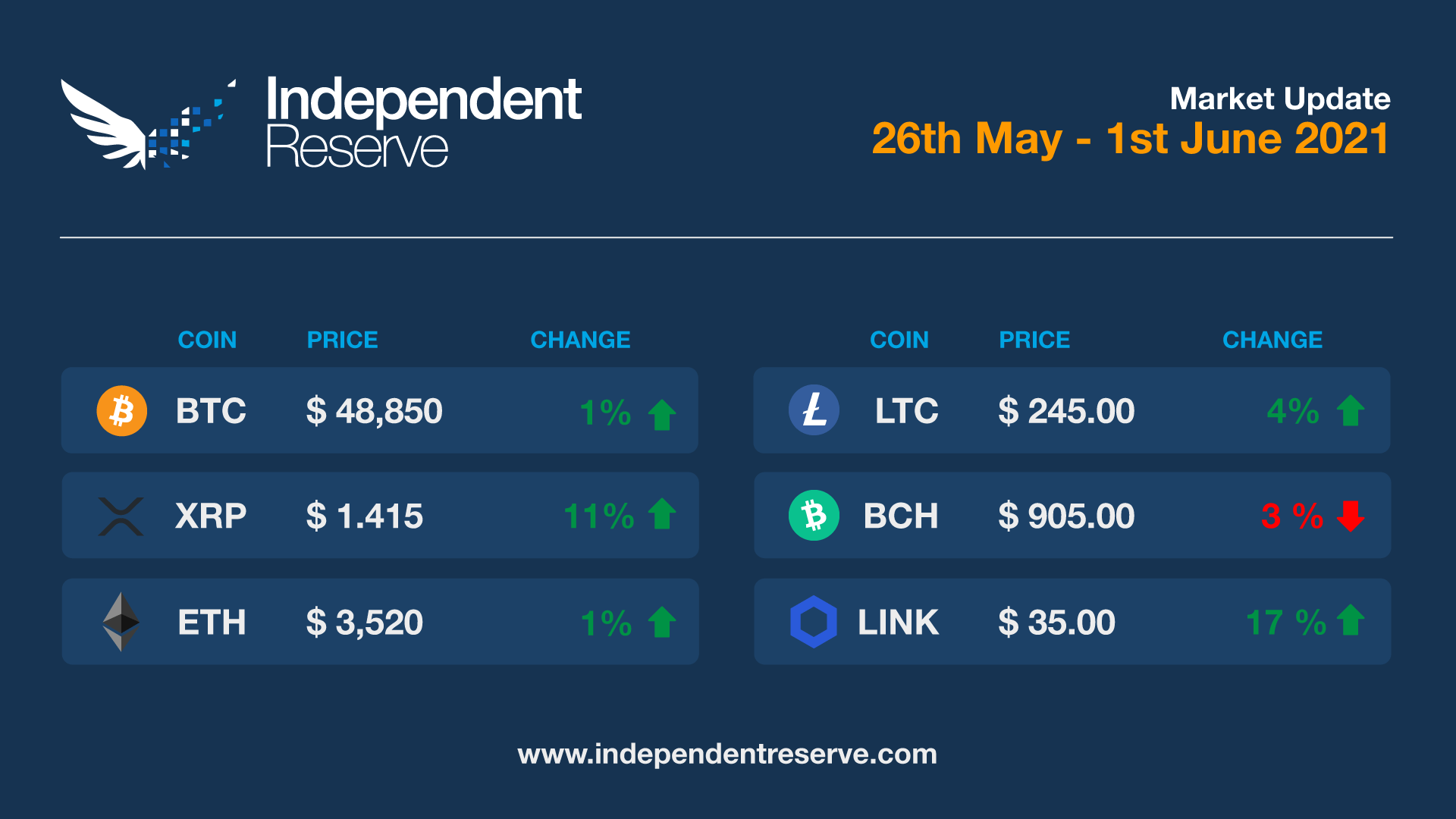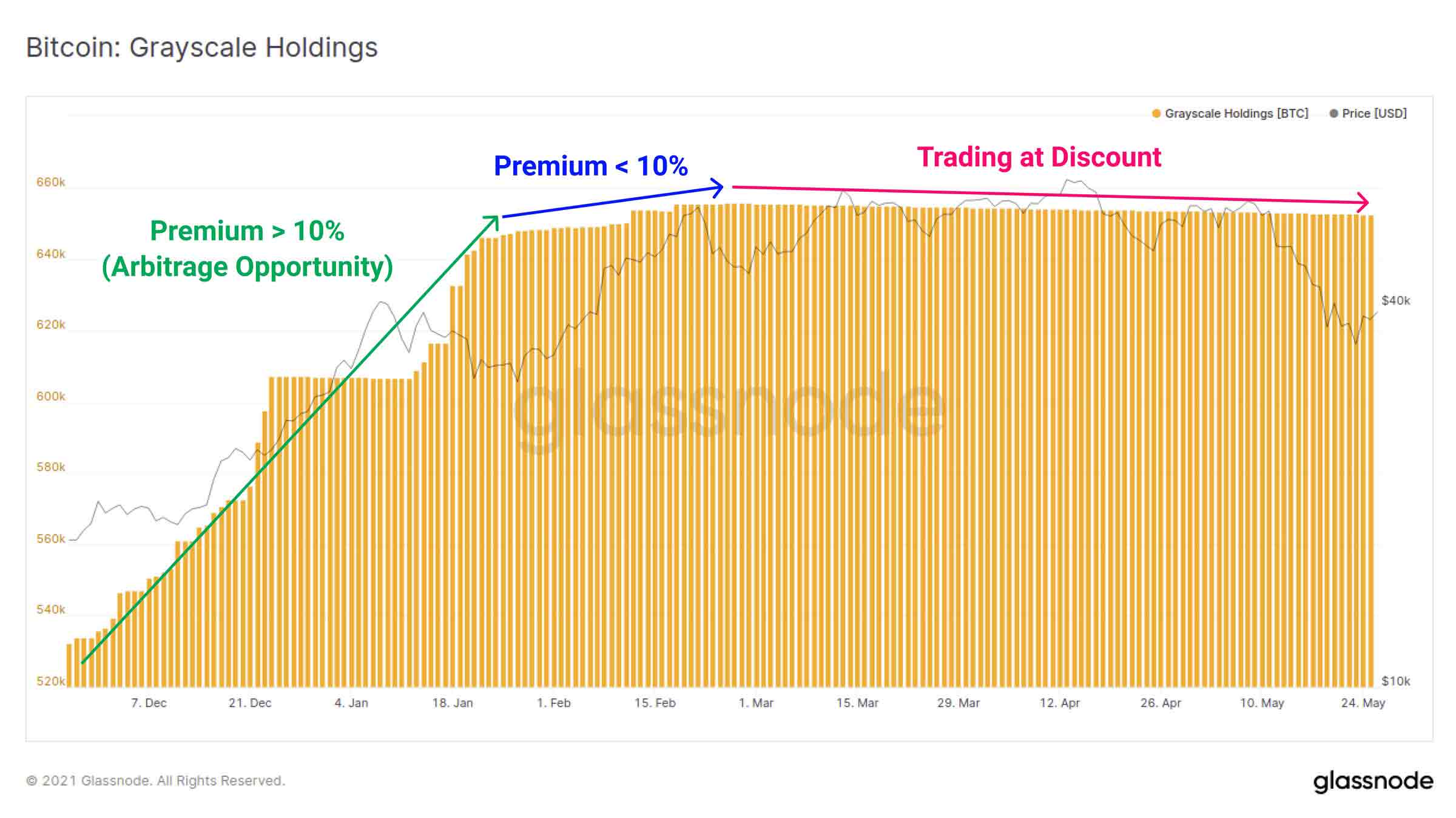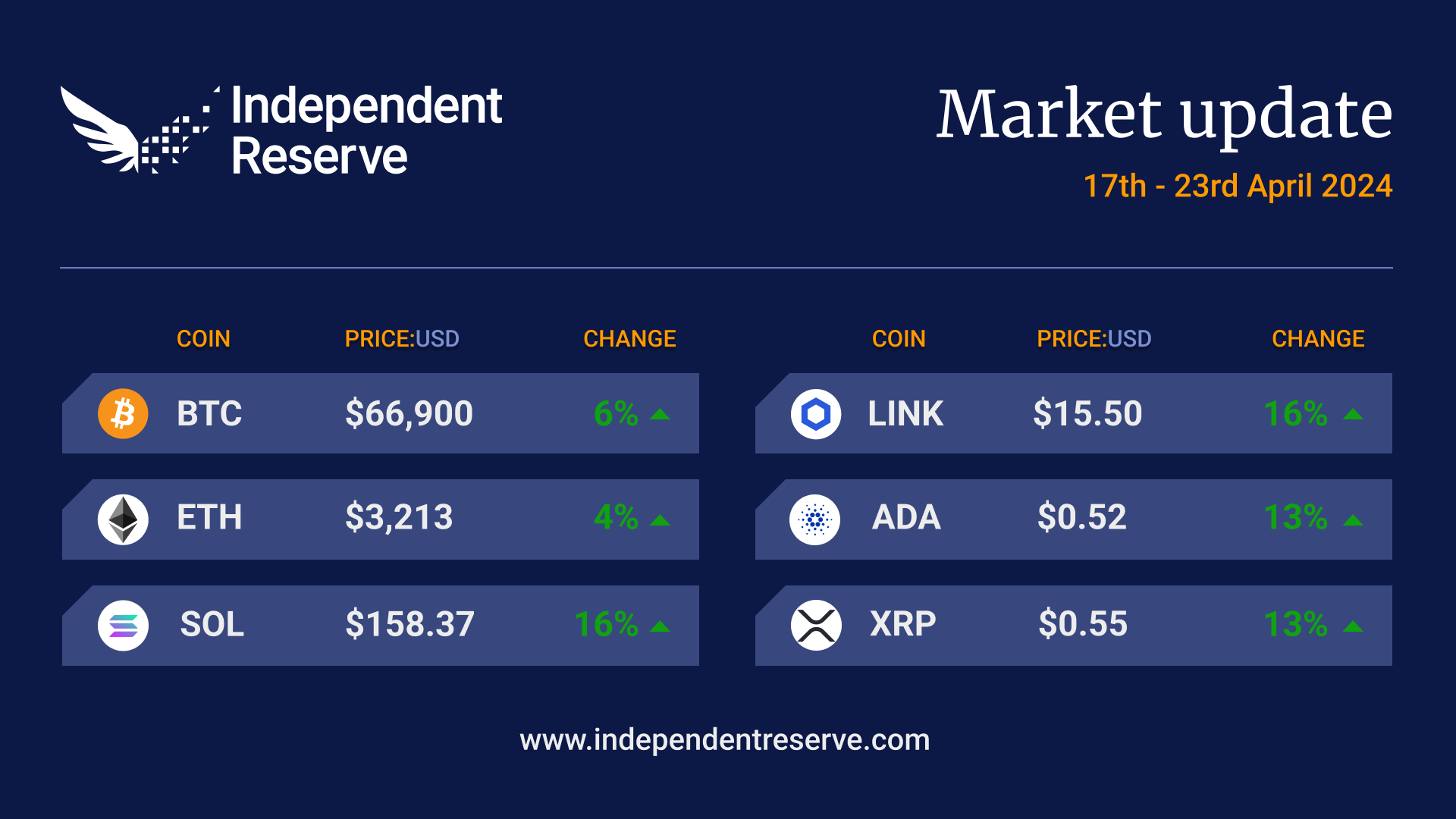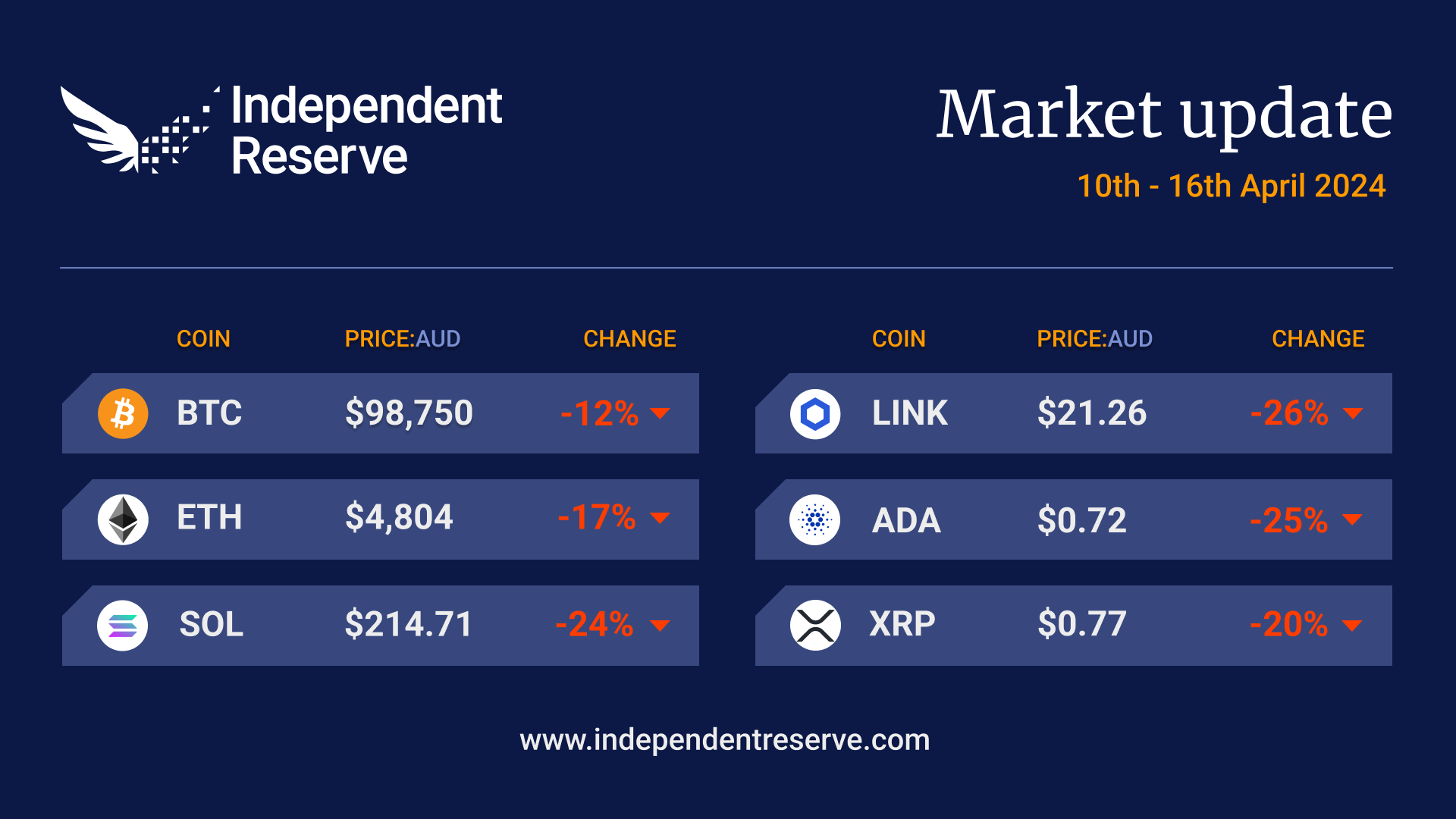In Markets
Bitcoin finished the month more than 36% down, in its worst performance since losing 37% in November 2018. The price is currently 3.9% below a week ago and it’s trading around A$48K (US$37K), which is around A$10K (US$7K) higher than it began the year. There are reports long term holders are buying the dip in preparation for a 2013 style double pump. Ethereum has seen a 9.3% pump in the past 24 hours and finishes the week 1.3% up. ETH volume has overtaken BTC volume on some days according to CoinGecko (which also counts DEX volume) and talk of the Flippening is once again doing the rounds. Polkadot was flat, XRP increased 9%, Chainlink was up 22.5%, Litecoin (2.8%) and EOS (17.8%). Bitcoin Cash fell 3.6%, Stellar (-7.4%), Aave (-2.6%) and Synthetix (-7.2%).

In Headlines
Help the Children’s Hospitals
Independent Reserve is donating Bitcoin to Sydney Children’s Hospitals Foundation and we would love for you to join us in raising crypto for an amazing cause. Click here to donate.
Billionaires buying Bitcoin
Billionaires who have written off Bitcoin in the past, are coming around. Ray Dalio, of the US$140B (A$180B) Bridgewater asset management company said at Consensus that he now owns BTC, though he’s not saying how much. Carl Icahn, chair of US conglomerate Icahn Enterprises, told Bloomberg TV that financial stimulus and inflation means the fund was looking at getting into crypto in “a big way”. “A big way for us would be a billion dollars, a billion and a half dollars, something like that,” he said. Though he hasn’t bought just yet, he sees more potential in Ether than BTC. Meanwhile billionaire Stanley Druckenmiller said he felt “like a moron” for not owning Bitcoin during 2017 so he bought US$20 million (A$26M) worth.
Tax time
The Australian Tax Office has released its annual warning to around 600,000 Aussie crypto users saying that it knows if you’ve been naughty or nice thanks to its data matching program with exchanges and banks. Canstar group executive Steve Mickenbecker pointed out they are trying to convince users to be honest by, “saying you won’t be able to hide your dealings so don’t put us through the pain of having to chase you up”. Every crypto to crypto, and crypto to fiat transaction needs to be recorded for capital gains, and any income from staking needs to be reported too. Independent Reserve developed the Crypto Tax Estimator with KPMG to make reporting taxes easier.
Going in Circles
USDC stablecoin issuer Circle has raised US$440 million (A$568M) in private equity investments — the largest such deal in crypto’s history. That may be in part because it offers institutions the chance to park their cash in regulated, high yield accounts earning 7% annually. That’s more than 10X the rate available on US 1-year Treasury bills, and it’s an easier sell for CFOs than adding Bitcoin to corporate reserves. “If companies wish to put their corporate reserves into a stablecoin and that is fully audited, it is like putting their money in a bank account which is what they normally do,” John Griffin, professor of finance at the University of Texas at Austin told Bloomberg – though he warned the higher yield was not risk free.
Going for a dip in Miami
The BTC price might be underperforming but that won’t stop the ‘biggest ever’ Bitcoin conference from going ahead in Miami this week. The three-day ‘Bitcoin 2021’ (June 4-5) is expected to host 12,000 attendees and features speakers including congressman Ron Paul, Miami Mayor Francis Suarez, MicroStrategy’s Michael Saylor, Gemini’s Winklevoss twins and RT host Max Keiser. Attendees have been forbidden from talking about altcoins. The virtual Consensus this week barely raised a ripple in mainstream interest this year, so hopefully a real-world event with Lambos can perform better.
Nature is healing
The Grayscale Bitcoin Trust premium has been showing signs of recovery. The premium refers to how much extra institutional investors are prepared to pay above the market value for the Bitcoin held per share in the Trust. It fell to -21% in March but recovered to -3.8% earlier this week. While it’s fallen back to -12.8% today, the trendline is headed in the right direction.

Layer two speeds up
Ethereum layer two scaling solution Arbitrum has just launched its mainnet for developers. Similar to Optimism, Arbitrum uses Optimistic rollups to dramatically speed up Ethereum transactions and reduce gas costs. Leading Ethereum DEX Uniswap held a vote this week and it looks set to launch its v3 iteration on the new scaling solution. SushiSwap has also announced their Arbitrum intentions. Synthetix exchange Kwenta announced on May 28 that it will soon launch the Kwenta L2 Beta, to allow trading in sETH, sBTC and sLINK initially before expanding to all the other assets. There are also now two Ethereum ETF proposals before the US SEC.
Bitcoin is too big to fail
Microstrategy’s Michael Saylor says Bitcoin has grown too big to fail. “There’s no historic precedent for a network that got to hundreds of billions of dollars that was fifty times bigger than its next best competition ever failing,” he told CNN. He suggested Bitcoin could last “a hundred years”. Saylor also said the Bitcoin Mining Council he set up with Elon Musk to promote renewable energy was required to combat a “hostile” narrative from anti bitcoin forces.
So, India hasn’t banned crypto…
Given the lack of clarity regarding cryptocurrency regulation in India, banks began disassociating themselves entirely from the space. In particular, two of the largest banks in India, HDFC and SBI, sent notices to account holders recently warning that cryptocurrency transactions “aren’t permitted as per RBI guidelines”. On May 31, however, the Reserve Bank of India (RBI) made it clear that banks and other regulated entities cannot cite its 2018 circular on cryptocurrencies as it has been set aside by the Supreme Court (SC) in March of 2020. The circular “is not valid” from the date of the SC order and cannot be cited or quoted from, the RBI said. Though hailed as a positive sign for investors, banks are still required to continue complying with relevant precautions of KYC (Know-Your-Customer), AML (Anti-Money-Laundering) laws, among others.
Until next week, happy trading!


